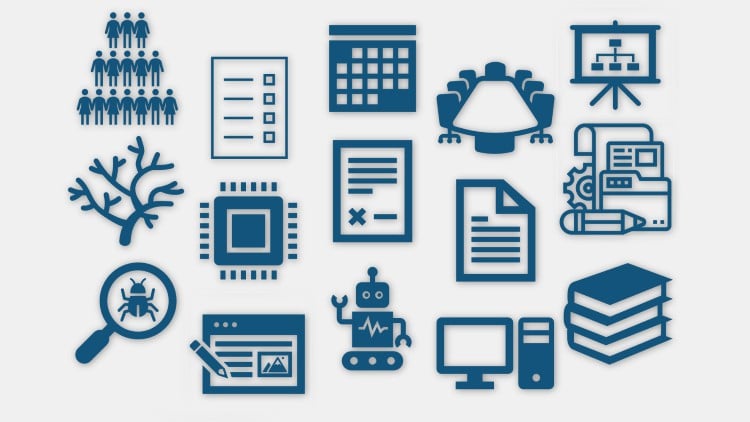
Improving software development productivity. Practical techniques.
⏱️ Length: 5.2 total hours
⭐ 4.10/5 rating
👥 79,236 students
🔄 February 2022 update
Add-On Information:
Note➛ Make sure your 𝐔𝐝𝐞𝐦𝐲 cart has only this course you're going to enroll it now, Remove all other courses from the 𝐔𝐝𝐞𝐦𝐲 cart before Enrolling!
- Course Overview
- Unlock the secrets to a more efficient software development lifecycle with this comprehensive course.
- Dive deep into actionable strategies designed to boost your team’s output and overall effectiveness.
- Discover how to streamline workflows, minimize bottlenecks, and foster a culture of continuous improvement.
- This program is meticulously crafted to provide practical, immediate takeaways for individuals and teams across the software development spectrum.
- Gain a competitive edge by implementing proven techniques that enhance project delivery speed and quality.
- Explore the foundational elements of high-performing development environments and how to cultivate them.
- Understand the symbiotic relationship between individual contributions and collective team success.
- This course serves as a catalyst for transforming how software is conceived, built, and deployed.
- Learn to identify and dismantle the common impediments that hinder development velocity.
- Equip yourself with the knowledge to adapt to evolving project demands and technological landscapes.
- Experience a shift from reactive problem-solving to proactive optimization of the development process.
- The February 2022 update ensures you are learning the most current and relevant practices.
- With over 79,000 students already benefiting, this course represents a significant investment in professional growth.
- The 5.2 total hours of content are packed with high-impact lessons and practical examples.
- Achieve a remarkable 4.10/5 rating, a testament to the course’s value and effectiveness.
- Requirements / Prerequisites
- A foundational understanding of the software development lifecycle.
- Familiarity with common development team roles and responsibilities is beneficial.
- Access to a computer and stable internet connection for course material consumption.
- An open mind and a willingness to adopt new methodologies and perspectives.
- Basic problem-solving skills are helpful for applying the concepts learned.
- No prior advanced knowledge of specific tools is strictly required, as the course focuses on principles.
- An eagerness to improve personal and team output is the primary prerequisite.
- Skills Covered / Tools Used
- Efficiency Optimization Techniques: Strategies for reducing wasted effort and maximizing output.
- Workflow Streamlining: Methods to simplify and accelerate development processes.
- Bottleneck Identification and Resolution: Learning to pinpoint and overcome common project roadblocks.
- Team Collaboration Enhancement: Building stronger communication and cooperation within development teams.
- Process Automation Principles: Understanding how to leverage automation for repetitive tasks.
- Agile Methodologies (Implicit): Concepts that align with efficient and iterative development practices.
- Code Review Best Practices: Techniques for improving code quality and knowledge sharing.
- Dependency Management Strategies: Ensuring smooth integration and minimizing conflicts.
- Time Management for Developers: Prioritization and allocation of tasks for maximum impact.
- Continuous Integration/Continuous Deployment (CI/CD) Concepts: Understanding the principles behind automated pipelines.
- Effective Communication Strategies: Facilitating clearer and more productive interactions within the team.
- Performance Measurement Metrics: Identifying key indicators of development productivity.
- Root Cause Analysis: Investigating issues to prevent recurrence.
- Feedback Loops: Implementing mechanisms for continuous learning and improvement.
- Resource Allocation Optimization: Ensuring the right resources are available at the right time.
- Benefits / Outcomes
- Significantly increased team velocity and output.
- Reduced project delivery times without compromising quality.
- Improved team morale and job satisfaction through efficient processes.
- Enhanced product quality due to streamlined development and testing.
- Greater predictability in project timelines and deliverables.
- A more proactive and less reactive development environment.
- Empowered team members who contribute more effectively.
- The ability to tackle more complex projects with existing resources.
- A stronger competitive advantage in the software market.
- Reduced technical debt through early identification and resolution of issues.
- A scalable framework for productivity that can grow with your team.
- Better alignment between development efforts and business objectives.
- Increased confidence in project planning and execution.
- The development of a sustainable culture of high performance.
- Personal professional growth and enhanced career prospects.
- PROS
- Highly Practical and Actionable: Focuses on techniques you can implement immediately.
- Broad Applicability: Useful for a wide range of roles within a development team.
- Proven Success: High student count and rating indicate significant value.
- Up-to-Date Content: Recent update ensures relevance.
- Cost-Effective: Provides substantial learning for its length.
- CONS
- General Principles: May require supplemental learning for specific tool implementations.
Learning Tracks: English,IT & Software,Other IT & Software
Found It Free? Share It Fast!